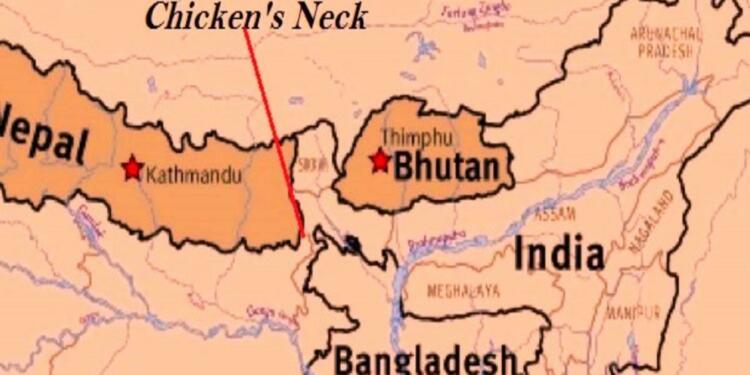The Siliguri Corridor, or what is more famously known as the “Chicken’s Neck” corridor is back in news. But we are getting some good news this time around. India has finally found an effective solution to bypass the strategically vulnerable corridor and secure access between the eight Northeastern states and the rest of India. The solution is a new rail route passing through Bangladesh.
So, what is the “Chicken’s neck” problem and what exactly is India’s solution to this issue? Let’s find out.
The Chicken’s Neck corridor
India’s chicken neck or the Siliguri corridor is a region that shares a border with Bhutan, Nepal, Bangladesh and China with an area of just over 100 km in India’s control.
Effectively, the Siliguri corridor becomes a narrow strip of 22 km and the Indian State must keep this narrow stretch of land unhindered if the Northeast has to be administered effectively.
This region is extremely important from the security point of view because it connects the rest of the country to Assam and other Northeastern states. All logistics, troops and other essential supplies moving to the Line of Actual Control (LAC) on the effective Indo-Tibet border move through this area.
Read more: The corridor that poses a grave security threat to the nation, and sadly we aren’t doing enough
The geography and topography of the region are also a challenge in themselves with several hilly tracts.
Strategists understand that securing the Siliguri corridor is central to safeguarding India’s territorial integrity. It is also crucial for checking Chinese expansion in the Himalayas.
A more practical option however is to find a new route connecting India and the Northeast that would save travel time and costs, while ensuring that the threat to connectivity between the Northeast and the rest of India is also addressed.
The threat
The vulnerability of the Chicken’s neck or the Siliguri corridor has emerged as a visible threat in the recent past.
During the anti-CAA protests, Sharjeel Imam had reportedly said, “Cutting off Assam is our responsibility. Let Assam and India be separated, only then they will listen to us. You know what the condition of Muslims is in Assam, CAA, NRC has been done over there, people have been thrown in detention camps and well, the massacre is taking place over there but in the next 6-8 months, we will find that all Bengalis have been killed, be it Hindu or Muslim. So, if we want to help Assam, we will have to close the gateway to the northeast.”
He had added, “The Chicken’s neck belongs to the Muslims, that area is dominated by Muslims.”
Read more: Delhi Court slams Sharjeel Imam with Sedition charges for anti-CAA protest speeches
Be it the threat of external aggression or local issues, the Siliguri corridor remains vulnerable. Any blockage on this narrow strip of land can create an awkward situation. Therefore, India has found an effective solution to the issue.
Bypassing the Chicken’s neck problem
The Indian government is now planning a rail route to connect its Northeastern state of Meghalaya with the rest of the country’s territory. The route would pass through Bangladesh and effectively bypass the vulnerable Chicken’s Neck corridor.
The planned route is supposed to enter Bangladesh from Hilli, before moving through Ghoraghat, Palashbari and Gaibandha in India’s neighbouring country. Finally, the rail route would cross the Jamuna (Brahmaputra) and reach Tura in Meghalaya.
The route will be strategically more viable because it will not be passing through a thin strip of land. Also, it will help the people of Meghalaya as the rail distance to Tura will be cut down from 600 km to 120 km. And from thereon, other Northeastern states can be easily accessed.
Also, it will be a means of improving Indo-Bangladesh relations. When cross-border railways will be built between the two countries, it will lead to better people-to-people ties and business exchanges across the two sides of the border.
Ultimately, the new route will be a shot in the arm for India’s territorial integrity, access to the Northeast, national security and overall economics. India has thus found an effective solution to its Chicken’s neck problem.
























